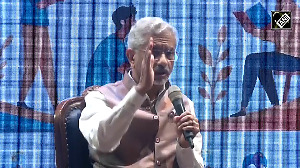Dismissing the role of TRAI in sorting out the problems of cable TV industry, operators on Thursday demanded that the government set up an independent broadcasting authority and adopt a "Pakistan-type model" for determining the prices of pay channels.
In a memorandum submitted to Prime Minister Manmohan Singh, representatives of various cable bodies said the government should enact a broadcast legislation on the lines of Broadcasting Bill 1997, drafted by present I&B Minister Jaipal Reddy during his earlier tenure.
The new cable TV regime: Complete coverage
"The Broadcast Bill of 1997 had effective clauses to check broadcasters from becoming cable operators and vice versa. Government should enact a law on the lines of the bill to regulate satellite broadcasting," the memorandum submitted by Cable Operators Federation of India, National Cable and Telecommunications Association, and Cable Networks Association said.
The operators demanded that the government adopt a pricing structure similar to that prevalent in Pakistan.
"The Pakistan Media Regulatory Authority has regulated the pricing of the same foreign channels, which are broadcast over India to Rs 2 per month per subscriber only. The same channels are charging almost 15 times that amount in India," CNA general secretary Rakesh Datta told newspersons in New Delhi.
He said in case such a system was adopted in India, it could lead to stabilisation of prices for consumers as well as end the "arbitrary" price hikes by pay channels.
The operators also said that TRAI was a "failure" as it was not able to regulate the broadcasters. "At the very outset, TRAI has no power to control the foreign broadcasters and thus a separate legislation is required to keep them under check," Datta said.
The cable operators alleged that the 1997 Broadcast Bill could not be made into a law due to broadcasters' influence, adding that India is the only country, which has no law to regulate the sector.
They also said TRAI was planning to recommend doing away with conditional access system in favour of a TRAP system "which is an obsolete technology."
"This would put the cable industry at a disadvantage over DTH and broadband," they said, adding over Rs 800 crore (Rs 8 billion) had already been invested in implementing CAS.
Moreover, the TRAP system was in sync with broadcasters' objective of selling the entire bouquet instead of individual channels. The TRAP blocks a spectrum of frequency, affecting the quality of viewing. Consumers would be able to watch either the whole bouquet of channels or none at all, the operators said.
Implementation of CAS would have adversely hit the broadcasters as their dual revenue stream of advertisement and subscription revenues on pay channels would have been hit.
While on the one hand the advertisers would first check the penetration of each channel before placing the ads, on the other the viewers would reject pay channels having higher ads content, the operators said.
The Chennai high court has also quashed the notification stopping CAS in the four metros, the operators noted and asked for immediate implementation of CAS.





 © 2025
© 2025